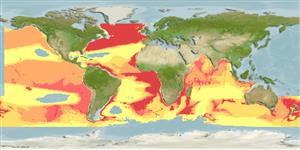Preferred temperature (Ref.
115969): 1.9 - 4.6, mean 2.9 (based on 4347 cells).
Índice de diversidade filogenética (Ref.
82804): PD
50 = 0.7500 [Uniqueness, from 0.5 = low to 2.0 = high].
Bayesian length-weight: a=0.00331 (0.00267 - 0.00411), b=3.15 (3.08 - 3.22), in cm Total Length, based on LWR estimates for this species (Ref.
93245).
Nível Trófico (Ref.
69278): 3.6 ±0.47 se; based on food items.
Resiliência (Ref.
120179): Muito baixo(a), tempo mínimo de duplicação da população maior que 14 anos (K=0.05-1.0; tm=15; tmax=44).
Fishing Vulnerability (Ref.
59153): High to very high vulnerability (70 of 100).
Climate Vulnerability (Ref.
125649): Moderate vulnerability (38 of 100).
